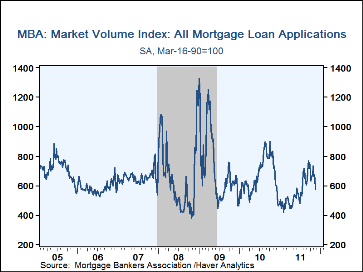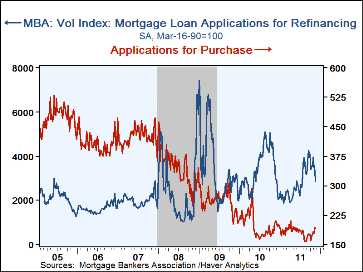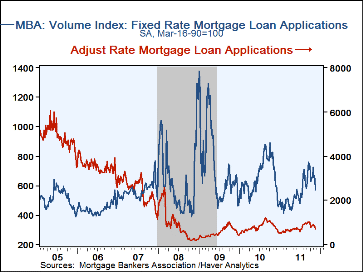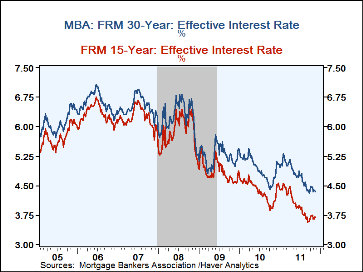 Global| Nov 30 2011
Global| Nov 30 2011U.S. Mortgage Applications Drop Precipitously From Early-Month High
by:Tom Moeller
|in:Economy in Brief
Summary
Let's talk about a reversal. The index of total mortgage applications fell 11.7% last week to 576.4 (March 16, 1990 = 100). Its was the third consecutive weekly decline and reversed all of the gains since late-July. Since early this [...]
Let's talk about a reversal. The index of total mortgage applications fell 11.7% last week to 576.4 (March 16, 1990 = 100). Its was the third consecutive weekly decline and reversed all of the gains since late-July. Since early this month applications have fallen by nearly one-quarter.
Applications to refinance have fallen the hardest. They dropped 15.3% last week. They were the lowest since late-July and down by one-third from the late-September high. Relatively well behaved were weekly applications to purchase a home which slipped just 0.8% w/w and remained near the recent high. However, they are still off almost two-thirds versus before the recession. Applications for a fixed-rate mortgage fell for the third straight week (-5.2% y/y) while variable rate financings were off to a lesser degree during recent weeks (-7.2% y/y).
The effective rate on fixed-interest, conventional 15-year mortgages held steady w/w at 3.69%, just above the record low of 3.57%. The effective rate on 30-year fixed rate loans held at 4.35%. On a 30-year Jumbo the effective rate was 4.68%. Though it's narrowed slightly of late, the spread between 15- and 30-year loan rates continued wide by historical standards. The effective interest rate on an adjustable 5-year mortgage fell to 3.15% from 3.26% averaged last month.
The Mortgage Bankers Association surveys between 20 to 35 of the top lenders in the U.S. housing industry to derive its refinance, purchase and market indexes. The weekly survey covers roughly 50% of all U.S. residential mortgage applications processed each week by mortgage banks, commercial banks and thrifts. The figures for weekly mortgage applications are available in Haver's SURVEYW database.
The Failure to Forecast the Great Recession from the Federal Reserve Bank of New York is available here.
| MBA Mortgage Applications (SA, 3/16/90=100) | 11/25/11 | 11/18/11 | 11/11/11 | Y/Y % | 2010 | 2009 | 2008 |
|---|---|---|---|---|---|---|---|
| Total Market Index | 576.4 | 652.5 | 660.5 | -5.3 | 659.3 | 736.4 | 642.9 |
| Purchase | 192.1 | 193.6 | 178.9 | -7.3 | 199.8 | 263.5 | 345.4 |
| Refinancing | 2,834.5 | 3,344.7 | 3,483.9 | -14.7 | 3,348.1 | 3,509.2 | 2,394.1 |
| 15-Year Mortgage Effective Interest Rate (%) | 3.69 | 3.71 | 3.65 | 4.06 (11/10) |
4.39 | 4.85 | 5.88 |
Tom Moeller
AuthorMore in Author Profile »Prior to joining Haver Analytics in 2000, Mr. Moeller worked as the Economist at Chancellor Capital Management from 1985 to 1999. There, he developed comprehensive economic forecasts and interpreted economic data for equity and fixed income portfolio managers. Also at Chancellor, Mr. Moeller worked as an equity analyst and was responsible for researching and rating companies in the economically sensitive automobile and housing industries for investment in Chancellor’s equity portfolio. Prior to joining Chancellor, Mr. Moeller was an Economist at Citibank from 1979 to 1984. He also analyzed pricing behavior in the metals industry for the Council on Wage and Price Stability in Washington, D.C. In 1999, Mr. Moeller received the award for most accurate forecast from the Forecasters' Club of New York. From 1990 to 1992 he was President of the New York Association for Business Economists. Mr. Moeller earned an M.B.A. in Finance from Fordham University, where he graduated in 1987. He holds a Bachelor of Arts in Economics from George Washington University.
More Economy in Brief
 Global| Feb 05 2026
Global| Feb 05 2026Charts of the Week: Balanced Policy, Resilient Data and AI Narratives
by:Andrew Cates










